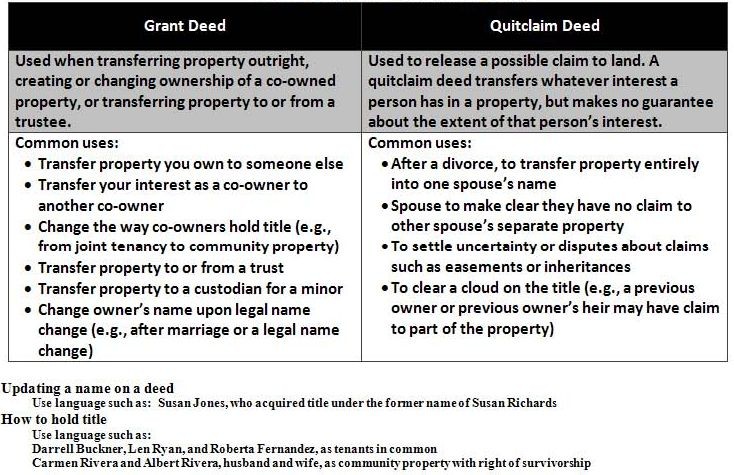Five Things to Know About Quitclaim Deeds
Post on: 6 Май, 2015 No Comment

A deed is a legal instrument used to grant a right. Deeds are part of the broader category of documents under seal. Deeds can be described as contract-like, as they require the mutual agreement of more than one person. Deeds can therefore be distinguished from covenants. which being also under seal, are unilateral promises. The deed is best known as the method of transferring title to real estate from one person to another, often using a description of its metes and bounds . However, by the general definition, powers of attorney. commissions. patents. and even diplomas conferring academic degrees are also deeds.
Historically at common law. for an instrument to be a valid deed it needed six things:
- It must indicate that the instrument itself conveys some privilege or thing to someone. This is indicated by using the word hereby or the phrase by these presents in the sentence indicating the gift.
- The grantor must have the legal ability to grant the thing or privilege.
- The person receiving the privilege or thing must have the legal capacity to receive it.
- A seal must be affixed to it. Most jurisdictions have eliminated this requirement and replaced it with the signature of the grantor with some number of signing witnesses. Most jurisdictions also require that the deed be acknowledged before a notary public or a civil law notary .
- It must be delivered to and accepted by the recipient.

Conditions attached to the acceptance of a deed are known as covenants.
Types of deeds
General warranty and special warranty
In the transfer of real estate, a deed conveys ownership from the old owner (the grantor) to the new owner (the grantee), and can include various warranties. The precise name of these warranties differ by jurisdiction. However the basic difference between them is the degree to which the grantor warrants the title. The grantor may give a general warranty of title against any claims, or the warranty may be limited only to claims which occurred after the grantor obtained the real estate. The latter type of deed is usually known as a special warranty deed. While a general warranty deed is normally used for residential real estate sales and transfers, special warranty deeds are more commonly used in commercial transactions.
Bargain and sale deed
A third type of deed, known as a bargain and sale deed. implies that the grantor has the right to convey title but makes no warranties against encumbrances. This type of deed is most commonly used by court officials or fiduciaries that hold the property by force of law rather than title, such as properties seized for unpaid taxes and sold at sheriff’s sale. or an Executor.
Quitclaim deed
A so-called quitclaim deed is (in most states) actually not a deed at all—it is actually an estoppel disclaiming rights of the person signing it to property.
Deed of trust
In some jurisdictions, a deed of trust is used as an equivalent to a mortgage. A trust deed isn’t like the other types of deeds; it’s not used to transfer property directly. It is commonly used in some states (California, for example) to transfer title to land to a “trustee,” usually a trust or title company, which holds the title as security (in escrow ) for a loan. When the loan is paid off, title is transferred to the borrower by recording a release of the obligation and the trustee’s contingent ownership is extinguished. Otherwise (upon default), the trustee will liquidate the property (with a new deed) and offset the lender’s loss with the proceeds.














